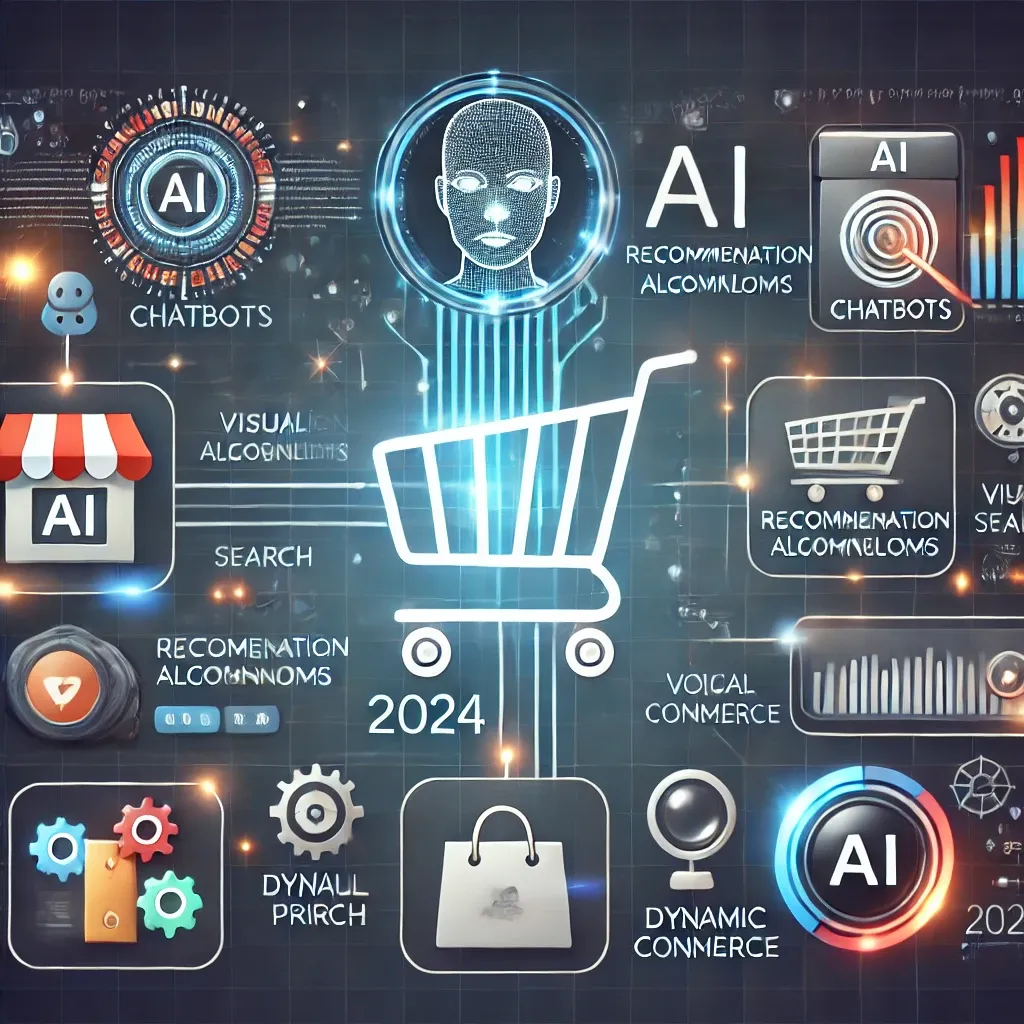
How AI is Revolutionizing E-commerce in 2024: Trends and Insights
E-commerce is evolving at a rapid pace, and Artificial Intelligence (AI) is at the forefront of this transformation. In 2024, AI-powered tools are enhancing customer experiences, streamlining logistics, and revolutionizing online marketing strategies. With consumers demanding faster and more personalized shopping experiences, businesses are turning to AI to stay competitive.
This article explores the key AI trends in e-commerce and how they are driving growth and innovation.
1. Personalized Product Recommendations
AI algorithms analyze customer behavior, purchase history, and preferences to provide personalized product recommendations. These tailored suggestions improve customer engagement and boost conversion rates.
Examples of personalized recommendations include:
- Recommended products based on previous searches and purchases.
- Targeted emails with product suggestions.
- Dynamic product pages customized for individual users.
This level of personalization creates a seamless shopping experience, increasing customer satisfaction.
2. Chatbots and Virtual Shopping Assistants
AI-powered chatbots are becoming essential in customer service. These virtual assistants offer real-time support, answering queries, providing product information, and guiding users through the buying process.
Benefits of AI chatbots:
- 24/7 customer support without human intervention.
- Reduced response time for customer inquiries.
- Automated handling of common issues and returns.
Advanced chatbots can even mimic human conversations, enhancing user engagement.
3. Visual Search Technology
Visual search technology allows customers to search for products using images instead of text. AI analyzes the image and suggests visually similar products available on the platform.
Use cases of visual search:
- Customers upload a photo of a product to find matching items.
- Retailers enable “Shop the Look” functionality on their websites.
- Brands identify trends through user-generated content analysis.
This feature enhances user convenience, making it easier for shoppers to find desired products.
4. AI-Powered Inventory Management
Efficient inventory management is crucial for e-commerce businesses. AI analyzes sales trends, customer demand, and market conditions to optimize stock levels.
Key benefits of AI-driven inventory management:
- Prevents stockouts and overstocking issues.
- Reduces holding costs by optimizing storage.
- Predicts seasonal demand and adjusts stock accordingly.
This ensures a smooth supply chain and minimizes disruptions.
5. AI in Fraud Detection and Prevention
E-commerce platforms handle vast amounts of transactions daily, making them vulnerable to fraud. AI models analyze transaction patterns to identify suspicious activities in real-time, reducing the risk of financial losses.
Features of AI-based fraud detection:
- Detection of unusual payment behaviors.
- Verification of customer identities.
- Automated blocking of suspicious transactions.
AI enhances security, protecting both customers and businesses.
6. Dynamic Pricing Strategies
AI-powered dynamic pricing tools adjust product prices based on demand, competition, and customer behavior. These tools help businesses remain competitive while maximizing revenue.
Key elements of dynamic pricing:
- Adjusting prices based on peak shopping hours.
- Offering discounts to encourage quick sales.
- Analyzing competitor prices and adjusting accordingly.
Dynamic pricing ensures businesses optimize profits without alienating customers.
7. AI and Voice Commerce
With the rise of smart speakers and virtual assistants, voice commerce is gaining traction. AI enables customers to search, purchase, and reorder products using voice commands.
Examples of voice commerce:
- Placing orders via Alexa, Google Assistant, or Siri.
- Reordering household items through voice-enabled apps.
- Voice-based recommendations for frequently purchased products.
This technology offers a hands-free shopping experience, enhancing convenience.
8. Challenges of AI in E-commerce
Despite its benefits, implementing AI in e-commerce presents some challenges:
- Data Privacy: AI requires access to customer data, raising privacy concerns.
- Integration Complexity: Implementing AI tools requires seamless integration with existing systems.
- Cost of Implementation: AI-powered solutions can be expensive for small businesses.
Businesses need to address these challenges to ensure smooth AI adoption.
Conclusion
AI is revolutionizing e-commerce, enhancing customer experiences, improving logistics, and optimizing marketing efforts. As AI technology evolves, businesses that embrace these innovations will stay ahead in the competitive e-commerce landscape.
By leveraging AI-powered solutions, companies can provide personalized experiences, ensure smooth operations, and boost revenue, creating a win-win situation for both customers and businesses.







0 Comments